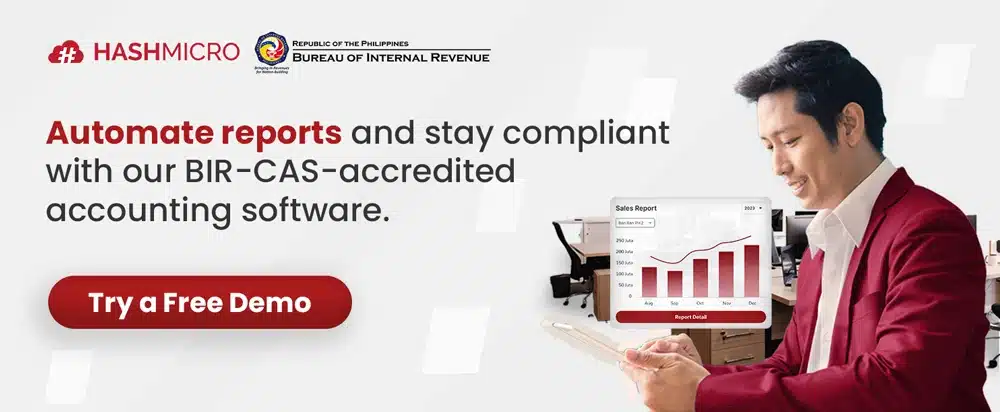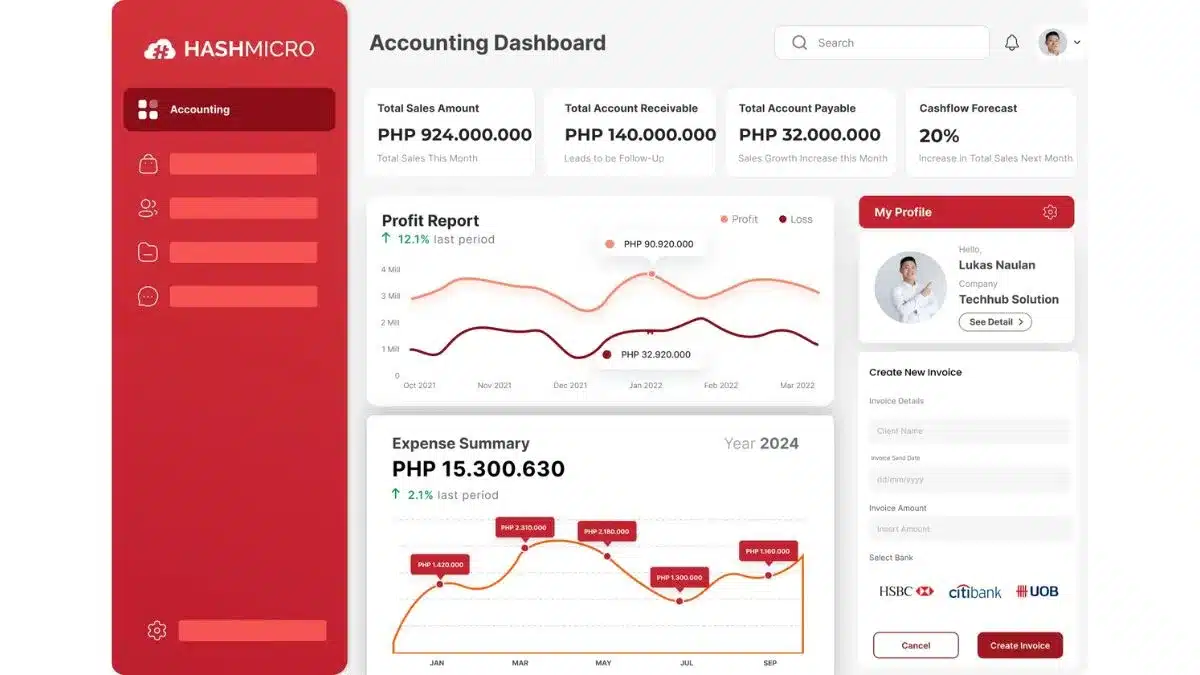In today’s globalized economy, businesses operate across borders, necessitating a clear understanding of international accounting practices. This knowledge ensures accurate financial reporting and compliance with diverse regulatory standards.
However, managers often encounter challenges such as navigating varying accounting standards, dealing with currency fluctuations, and understanding tax implications in different jurisdictions. These complexities can lead to inconsistencies and potential compliance issues.
A recent survey by PwC Philippines revealed that 90% of CEOs identified inflation as a significant threat, while 89% were concerned about macroeconomic instability. This highlights the importance of robust accounting practices in uncertain times.
To effectively address these challenges, this article explores international accounting intricacies and how HashMicro’s Accounting Software provides a fully integrated solution for seamless compliance, multi-currency management, and real-time financial reporting.
Table of Contents

Key Takeaways
|
What is International Accounting?
International accounting refers to standardized financial reporting principles used globally to ensure consistency and comparability. These standards help businesses maintain transparency, build investor confidence, and facilitate smooth cross-border transactions.
The International Accounting Standards Committee (IASC), established in 1973, introduced the first globally recognized accounting standards. Over time, these standards evolved into the International Financial Reporting Standards (IFRS), which are now widely adopted across various industries.
For professionals in the field, obtaining international accounting certifications validates expertise in global financial regulations. As businesses expand internationally, understanding what international accounting is essential for ensuring compliance and financial stability.
What are International Accounting Standards (IAS)?
International Accounting Standards (IAS) were created to establish a uniform financial reporting system for businesses worldwide. Developed by the IASC and later overseen by the International Accounting Standards Board (IASB), IAS provided a foundation for modern global accounting practices.
These standards helped businesses streamline financial reporting, enhance investor trust, and reduce compliance complexities. By ensuring accurate and comparable financial records, IAS supported companies operating in multiple jurisdictions.
However, in 2001, the IAS was replaced by the International Financial Reporting Standards (IFRS), which offers a more comprehensive framework. While IFRS is widely accepted, some countries, such as the United States, still use Generally Accepted Accounting Principles (GAAP) instead.
International Accounting Standards Board (IASB)
The International Accounting Standards Board (IASB) is an independent body responsible for developing and maintaining International Financial Reporting Standards (IFRS). Formed in 2001 as the successor to the IASC, the IASB plays a crucial role in standardizing global financial reporting.
The IASB, composed of 14 expert members from diverse regions and professional backgrounds, ensures that IFRS remains relevant and adaptable. It oversees the creation of IFRS Accounting Standards and approves interpretations developed by the IFRS Interpretations Committee.
Operating under the IFRS Foundation, the IASB follows a structured process involving public consultations and collaboration with stakeholders. Its work is essential for businesses seeking compliance with international accounting standards and professionals pursuing international accounting certifications.

What are International Financial Reporting Standards (IFRS)?
International Financial Reporting Standards (IFRS) are globally recognized accounting principles that enhance financial transparency and consistency. IFRS replaced IAS to provide more structured guidelines for financial reporting, transaction tracking, and compliance across industries.
Developed by the IASB, IFRS outlines requirements for key financial statements, including the Statement of Comprehensive Income, Changes in Equity Statement, and Statement of Cash Flow. These standards help businesses meet regulatory requirements and improve financial accuracy.
Although IFRS is widely adopted, some countries, including the United States, continue to use GAAP instead. Understanding the differences between IFRS and other frameworks is crucial for professionals looking to advance in international accounting.
HashMicro Accounting Solution as the Best Solution for Managing International Accounting
HashMicro’s Accounting Software offers an automated, all-in-one solution for global financial management, ensuring accuracy, compliance, and efficiency. As a BIR CAS and BIR EIS-approved system, it guarantees precise bookkeeping and full regulatory adherence, making it the ideal choice for businesses expanding across multiple regions.
Experience the power of HashMicro’s accounting software with a free demo designed to streamline global financial operations and simplify compliance. With real-time automation and financial tracking, businesses can easily eliminate manual errors, improve efficiency, and manage multi-currency transactions.
Why Choose HashMicro? Unlike traditional accounting systems, HashMicro integrates with procurement, inventory, and sales management. With automated currency conversion, tax compliance, and intercompany financial consolidation, businesses can ensure smooth international operations without complexities.
Key Features of HashMicro’s Accounting Software for International Businesses
- Integration & Automation – The system automatically reconciles bank transactions, processes multi-currency payments, and updates financial records in real time. This ensures accurate financial tracking, reduces manual errors, and enhances cash flow management across multiple countries.
- Multi-Level Financial Analysis – HashMicro aggregates financial data from different branches, projects, and departments into a centralized dashboard. This provides real-time insights, enabling business leaders to make informed financial decisions for international operations.
- Budgeting & Forecasting – The software tracks budgets, forecasts cash flow, and assesses financial risks using AI-powered analytics. This helps businesses anticipate market trends, allocate resources wisely, and maintain long-term economic stability.
- Financial Reporting & Compliance – It automatically generates IFRS-compliant reports, tax documentation, and financial statements tailored to regulatory standards. This ensures smooth compliance with global financial laws and minimizes the risk of penalties.
- Multi-Company & Intercompany Transactions – The system automates intercompany invoicing, reconciliations, and consolidated financial reporting. This eliminates discrepancies in cross-border transactions, ensuring transparency and accuracy.
- Custom Invoicing & Receivables Management – Businesses can automate invoicing in multiple currencies, apply tax calculations, and track payments globally. This leads to faster collections, improved cash flow, and reduced outstanding receivables.
- Treasury & Cash Management – The platform monitors liquidity, tracks equity movements, and optimizes treasury functions in real-time. This enables businesses to prevent cash shortages, manage funds efficiently, and make strategic financial decisions.
- Landed Cost & Tax Compliance – The system calculates the total landed cost of imported goods, factoring in duties, shipping fees, and local tax regulations. This ensures accurate pricing, better cost control, and compliance with international trade policies.
- 3-Way Matching for Procurement – HashMicro cross-verifies invoices, purchase orders, and delivery receipts before approving payments. This prevents financial discrepancies, reduces procurement fraud, and ensures only valid transactions are processed.
With these advanced international accounting capabilities, HashMicro’s software is ideal for businesses seeking a seamless, automated, compliant financial management solution. Schedule a free demo today and take control of your international accounting with HashMicro!
Conclusion
Effective financial management is the backbone of any successful business, and international accounting ensures transparency, compliance, and accuracy across global operations. With companies expanding across multiple regions, navigating multi-currency transactions, tax regulations, and financial reporting standards requires a structured and efficient approach.
HashMicro’s Accounting Software provides an intelligent, fully integrated solution to simplify international financial management. With features like automated multi-currency transactions, IFRS-compliant reporting, and real-time financial tracking, HashMicro ensures businesses stay compliant while improving efficiency and decision-making.
Take control of your international accounting operations with HashMicro’s powerful, AI-driven accounting software. Schedule a free demo today and discover how automation can transform your financial management, enhance accuracy, and drive business growth across borders.








































